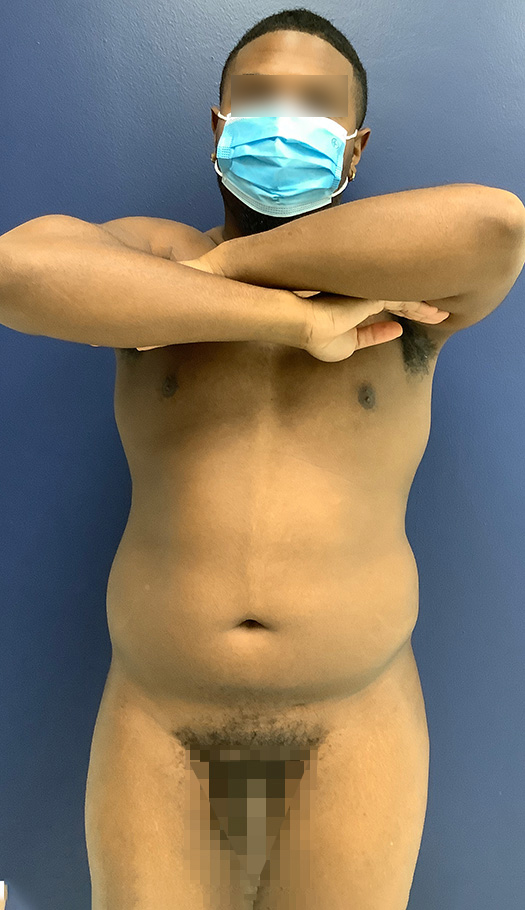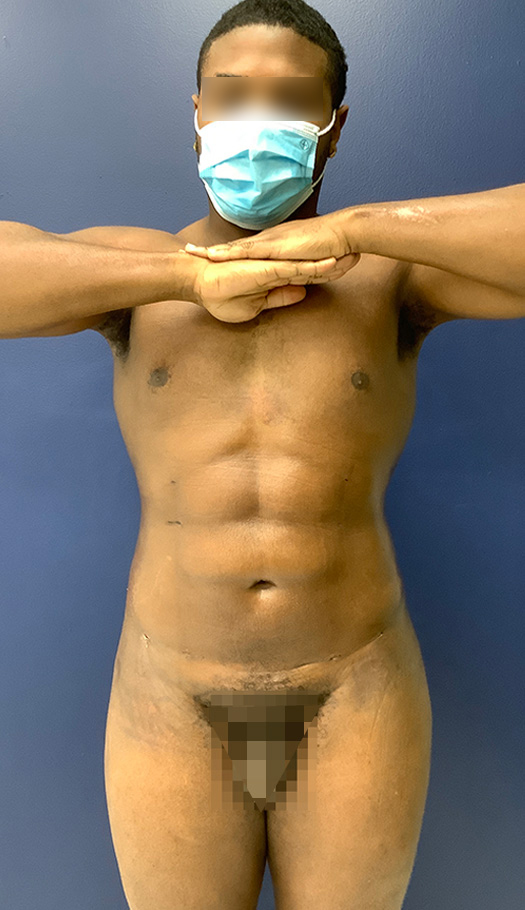
WHAT IS ABDOMINAL ETCHING?
Abdominal Etching is a procedure that enhances the definition of your abdominal muscles. During this cosmetic operation, your cosmetic surgeon uses liposuction to gently remove excess fat and reshapes the remaining tissue to form the muscular ripples and flat presentation that you desire.
To perform this simple Lipo etching procedure, the doctor does detailed markings of your flexed abs. Small incisions are then made in the abdomen. Using straw-like tubes called cannulas that are attached to a medical vacuum, fat is rearranged, thinned and sucked out in order to enhance the shape and appearance of your abdominal muscles. Since the procedure is only minimally invasive with minor scarring, healing is fast. Within two to five months, you should be able to achieve a tighter and more toned midsection gradually and naturally without the need for fillers or implants.
Who is a candidate for abdominal etching?
Before deciding to have any medical procedure, it is important to determine whether it is the best choice for your particular situation. You may be a good candidate for Abdominal Etching if:
- You are in good physical condition;
- You are at a healthy and stable weight;
- A nutritious diet and exercise have not given you the abs you want;
- You have realistic goals about surgical outcomes;
- You have an athletic build and good skin tone
- You have already had a procedure such as a tummy tuck and want to further enhance the appearance of your abdomen.
Difference between Liposuction & Abdominal Etching
Liposuction is a fat removal technique that uses gentle suction to take adipose tissue out of virtually any part of the body: your chin, neck, chest, abdomen, back, flanks, hips and thighs. It is also often performed in tandem with other surgical procedures to bring about enhanced contour throughout the physique.
Abdominal Etching in Miami, on the other hand, is a specific procedure in which advanced liposuction technique is used. Patients should already have reasonably well-developed abdominal muscles with a stubborn layer of fat lying over them. The procedure removes that excess adipose tissue and sculpts the abs to bring about the desired washboard stomach.
Abdominal etching in Miami
Before & After Pictures
EXPLORE PHOTO GALLERYThe Ab etching procedure
The abdominal etching procedure is similar to VASER liposuction, where the surgeon injects a saline solution mixed with local anesthesia. The surgeon will outline the six-pack onto the skin in the abdominal area prior to starting liposuction. The sketch is used as a guide when the fat is removed to strategically leave fatty tissue behind and create the illusion of carved muscles.
Abdominal etching surgery Steps
Anesthesia. Abdominal Etching is performed using general or local anesthesia to numb the targeted area. You will be awake and comfortable throughout the procedure, which should take only about an hour to complete. In some cases, your surgeon may opt to perform the procedure using general anesthesia. In this case, you will be totally asleep throughout the entire process.
How abdominal etching surgery is performed? This procedure should be performed by a liposuction surgeon who is board-certified and has demonstrated skill in six-pack surgery. It involves numbing the area and then inserting tiny vacuum-attached tubes called cannulas into your belly button or around the natural creases of your abdomen.
The doctor uses these to remove the unwanted layer of fat that is lying on top of your abdominal muscles and to strategically move and thin other tissue. What remains is sculpted and relocated and the tubes removed. The tiny incisions are closed, and your procedure is complete.
Aftercare. This is an outpatient procedure, meaning that you will go home on the same day. Generally, over-the-counter medications are sufficient to alleviate the minor discomfort you may feel for the first few days. Expect minor swelling, redness and bruises around your incisions for the first week.
Schedule A Free Consultation Today
Is abdominal etching permanent?
The results achieved during your Abdominal Etching procedure can last a lifetime as long as you maintain a healthy lifestyle that includes exercise and a nutritious diet. Significant weight gain or pregnancy can sabotage the effects of Abdominal Etching.
Abdominal Etching in Miami by Dr Luster - Video Result
Our skilled surgeons meticulously create natural-looking contours, leaving you with a more toned and athletic physique. If you've ever dreamt of achieving a chiseled midsection, this video will surely inspire you to take the next step towards your dream body!
Recovering from abdominal etching
The incisions for the abdominal etching procedure are minimal, so recovery is quite short and painless. It is normal for patients to experience drainage of a light pink fluid for the first 24 hours following surgery. In a few days, the binder placed during surgery is replaced with a compression garment, which you should wear for three weeks. Compression garments are quite helpful as they minimize space under the skin where fluid may accumulate post-operatively. It’s a great way to add that extra support and comfort you need during recovery, and nobody should notice you are wearing a compression garment under your clothes. Strenuous exercise such as weight lifting or any other activity that creates pressure to the abdomen must be avoided during the initial two weeks of recovery. Most patients go back to work in a week and resume their routine in three to six weeks.
It’s important patients don’t miss follow-up appointments to assess fluid collections or seromas. While seromas are a minor complication, they should be immediately treated if they occur. Minor complications only occur in about 22 percent of patients and seromas develop in 10 percent of patients, which can be managed by a simple office procedure.
ABDOMINAL ETCHING COST IN MIAMI
Abdominal etching costs an average of $6,000 in the Miami area with all anesthesia, operating fees, and compression garment included. This procedure is more costly than traditional liposuction because it takes more time, and it requires more surgical skill to be completed. Unfortunately, your insurance doesn’t cover ab etching, but your medications may be partially covered. At Avana we have several financing options available, which will be discussed during your initial consultation.
Get your six-pack
When endless hours of workout and a healthy diet still can’t remove the stubborn fat hiding underneath your abdominal muscles, and keeping you from having your six-pack abs, turn to a surgeon with skill and experience performing abdominal etching.
At Avana Plastic Surgery, we are selective and perform surgery only on patients whose general health and lifestyle will not interfere with surgery and recovery. Your safety is always our priority. We require a pre-operative assessment and physical examination to minimize risk and ensure you are ready for surgery.
We are committed to excellence and exceptional patient care and use only cutting edge technology to offer the best results possible for all our patients. For a free evaluation, call us today and schedule a personalized ab etching consultation with one of our talented surgeons.
Abdominal etching surgery FAQs
This procedure has a 90% rating on RealSelf. It’s a great way to get ab definition in just a few weeks or months as soon as the swelling is gone. The results are permanent, so you should enjoy a flat abdomen for years without recurrence of fat deposits.
The ab etching procedure typically takes an hour.
Abdominal etching is performed under general anesthesia, but some surgeons may prefer local anesthesia based on the extent of surgery. This is something your surgeon will cover during the initial assessment.
Some of the common risks from abdominal etching surgery include reactions to anesthesia, infection, scarring, and bleeding. Other risks include temporary loss of skin sensation and pulmonary embolism.
Patients are advised to avoid weight lifting or any other strenuous activity that puts pressure on the abdominal area for about two weeks following surgery. They can resume their regular physical activity in three to six weeks and gradually increase the difficulty of their workouts to weight lifting.
The final results are complete in about six months once the swelling has decreased. About 80 to 90% of the swelling should resolve during the first two weeks of recovery. Then you will see progressive improvement with all the swelling fully gone in about three months. For optimal results, patients are advised to follow a healthy diet low in sodium.
The results are permanent as long as you keep a healthy lifestyle that includes a balanced diet and workout routine.
When this procedure is done right the first time, there is no need to redo it.


